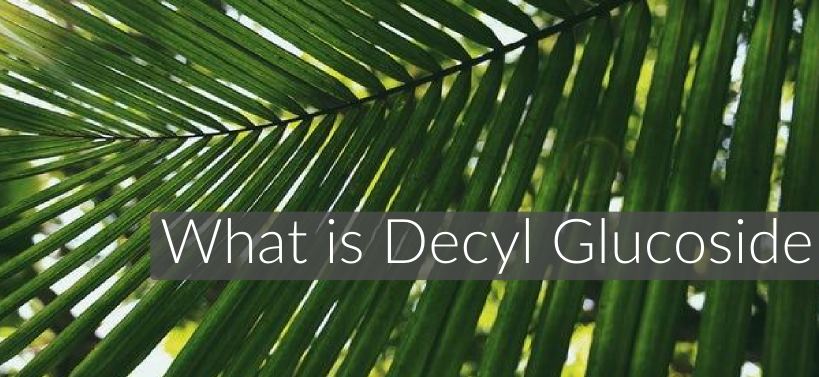What is Decyl Glucoside May 18 2015

What is Decyl Glucoside?
Decyl Glucoside is a very popular ingredient these days because it comes from corn and coconuts, so it's natural, and it's also bidegradable. You'll commonly find it used as a detergent/cleanser and sometimes it's labeled ambiguously as "non-ionic surfactant" which means that it has a neutral (no) charge, and it lowers the surface tension of water.
Decyl Glucoside is obtained from 100% renewable raw materials, through a combination of plant based fatty alcohol, decanol which is derived from coconut and glucose (corn starch). Decyl Glucoside is a mild, and gentle, surfactant and because it does not dry the skin it is ideal for the formulation of personal hygiene and toiletry products.
Decyl glucoside was first used in soaps and body cleansers because of its great foaming power, mildness, and its ability to lather easily and thicken while retaining skin moisture even when used repeatedly; prevent skin dryness. It also improves skin tolerance of a cosmetic formulation. Decyl glucoside is classified as a surfactant and this is why it is used in many products that are primarily used for personal hygiene and toiletries. It also helps to moisturize the skin to prevent inflammation and itchiness. Decyl glucoside has many other qualities making it compatible with other cleaning chemicals and agents.

Surfactants lower the surface tension of products they’re added to, helping them remove dirt and oils more effectively while stabilizing oil and water mixtures. As a surfactant it also improves a product's ability to wet surfaces and form foam that’s stable and long-lasting. Decyl Glucosise is used in our wrinkle releaser as a wetting agent. Decyl Glucoside, used as a co-surfactant, can reduce the total active requirements of other foaming ingredients, without altering their performance; cleansing effectiveness, foam volume, and ease of thickening, are all maintained while improving on the mild, and gentle, nature of the final formulation.
Is Decyl Glucoside Toxic?
Comparable to the other Alkyl Polyglucoside Surfactants, decyl glucoside is obtained from 100% renewable vegetable origin. The Cosmetic Ingredient Review (CIR) Expert Panel assessed the safety of 19 alkyl glucosides including decyl glucoside as used in cosmetics and concluded that these ingredients are safe in the present practices of use and concentration when formulated, and are nonirritating. Since glucoside hydrolases in human skin are likely to break down these ingredients to release their respective fatty acids and glucose, the Panel also reviewed CIR reports on the safety of fatty alcohols and were able to extrapolate data from those previous reports to support safety. Decyl glucoside is a gentle cleanser delicate enough even for the delicate skin on fruits, such as berries and cherry tomatoes, which is why it is used in Fruit & Veggie Sprays also.
Are people allergic to it?
In typical formulations, it’s gentle, non-irritating, non-allergenic, non-toxic, non-carcinogenic, and doesn’t have any known adverse effects on bodily organs or on reproductive health. It’s the ideal surfactant for people who have sensitive skin and those who are worried about the health effects of other surfactants. Decyl Glucoside does not contain any impurities. Its chemical nature and the production process results in a surfactant without ethylene oxide and is suitable for baby, and pet products.
It is mild and even aids in keeping skin’s natural health. Non-ionic surfactants like decyl glucoside are usually gentle and unlikely to irritate or dry out skin. Decyl glucoside has superior ability to form and hold stable foam for a non-ionic surfactant. This makes it ideal for bath products like bubble baths. For products that require even better foaming ability, it’s combined with other surfactants.
Tolerant of high electrolyte formulations and because decyl glucoside is a mild surfactant that doesn’t irritate the skin, products that may contain this all important ingredient include shampoos, conditioners, bubble baths, cleansers, shower gels, bath oils, dermatological liquid soaps, wipes, body washes, shaving foams, liquid soaps, toothpaste, hair coloring, hair straightening products and permanent wave solutions. It’s also a common ingredient in baby shampoo and a perfect ingredient in shaving creams and facial cleansers since it foams well and is gentle for all hair types.
It is also used in anti–dandruff shampoo treatments, eczema creams and lotions and many other skin care regiments. The inevitability of encountering it is slim because it is a common ingredient in most skin care products and hair care products as well.
This information about our ingredients is not intended to replace the advice of your licensed healthcare provider. It is always wise to consult your healthcare provider should you have questions regarding our ingredients.
